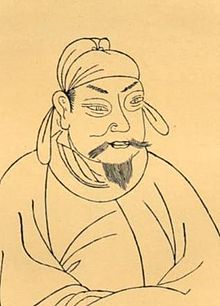Li Shiji
| Li Shiji | |
|---|---|

Portrait of Li Shiji from Sancai Tuhui
|
|
| General of the Tang dynasty | |
| Born | 594 |
| Died | December 31, 669 (aged 74–75) |
| Names | |
| Traditional Chinese | 李世勣 |
| Simplified Chinese | 李世勣 |
| Pinyin | Lǐ Shìjì |
| Wade–Giles | Li Shih-chi |
| Courtesy name | Maogong (Chinese: 懋功 / 茂功; pinyin: Màogōng; Wade–Giles: Mao-kung) |
| Posthumous name | Duke Zhenwu of Ying (simplified Chinese: 英贞武公; traditional Chinese: 英貞武公; pinyin: Yīng Zhēnwǔ Gōng; Wade–Giles: Ying Chen-wu Kung) |
| Other names |
|
Li Shiji (594 – December 31, 669), courtesy name Maogong, posthumously known as Duke Zhenwu of Ying, was a Chinese general who lived in the early Tang dynasty. His original family name was Xú, but he was later given the family name of the Tang imperial clan, Li, by Emperor Gaozu, the Tang dynasty's founding emperor. Later, during the reign of Emperor Gaozong, Li Shiji was known as Li Ji (i.e. the "Shi" in his name was omitted) to avoid naming taboo because the personal name of Emperor Gaozong's predecessor, Emperor Taizong (Li Shimin), had the same Chinese character "Shi". Li Shiji is also referred to as Xu Maogong (his original family name and his courtesy name combined) in the historical novels Shuo Tang and Sui Tang Yanyi.
Li Shiji was initially a follower of Li Mi, one of the rebel rulers rebelling against the preceding Sui dynasty, and he submitted to the Tang Empire after Li Mi did so, upon which Emperor Gaozu, impressed with his loyalty to Li Mi, granted him the family name "Li". He later participated in destroying Xu Yuanlang and Fu Gongshi, two of the Tang Empire's competitors in the campaign to reunify China. During the reign of Emperor Gaozu's son and successor, Emperor Taizong, Li Shiji participated in the successful campaigns against the Göktürks and Xueyantuo, allowing the Tang Empire to become the dominant power in eastern Asia, and also served as a chancellor. During the reign of Emperor Gaozong, he served as chancellor and the commander of the army against Goguryeo, destroying Goguryeo in 668. He died the next year. He and Li Jing were considered the two most prominent early Tang generals.
...
Wikipedia
